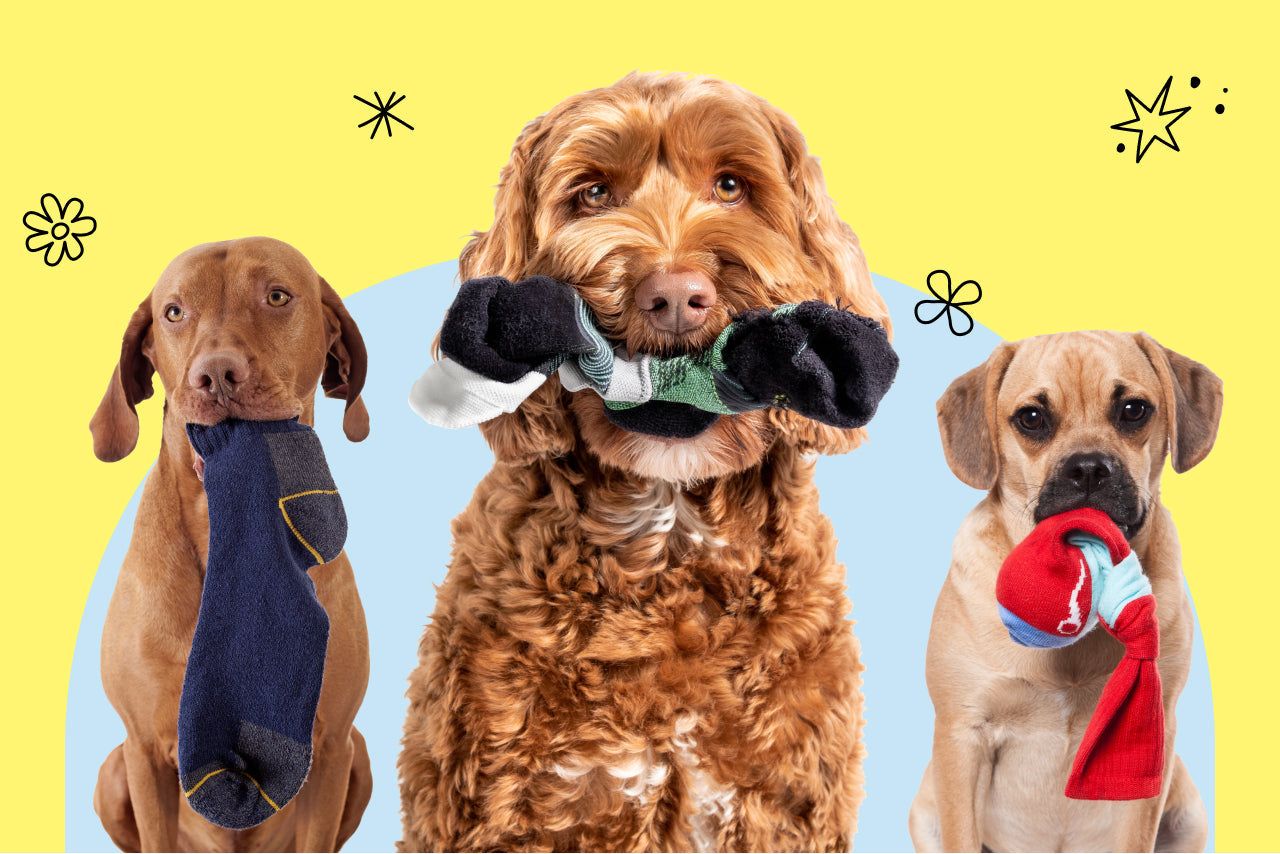
Where, oh where have your socks gone?
Written By: Tiffany Ruiz Dasilva, VMD, cVMA | Professional Services Veterinarian, Wild Earth
Have you come home from a long day at work to find evidence of chewed up socks? Or do you feel like your socks keep disappearing? Socks are among the many items that dogs love to chew on, and it can be frustrating when your favorite socks end up in pieces.
In this article, we will discuss why dogs like socks, and more importantly, different ways to keep your dog from chewing socks while still allowing them ample opportunity for playtime fun!
So why do dogs love socks?
The basic answer is that dogs need stimulation and chewing on toys is fun for our fur babies. Why socks though? Our socks are soaked in our scent, and because our pups love us, they tend to like anything that smells like us.
Socks are made of all sorts of materials that dogs find delicious such as cotton, especially when mixed with the sweat from your feet. Chewing socks might be tasty to them!
Puppies will generally chew on socks because they are teething, and socks are soft and can comfort their gums. And we have all been there - when we try to pull the sock away it becomes a fun game of tug-o-war, creating the association of socks with fun.
As dogs get older they may find the texture of socks to be interesting and, because they find our smell enjoyable, they get an added bonus. Plus, they likely get attention (bad or good) when they are caught with a sock in their mouth, adding to the pleasure associated with socks. Lastly, socks can provide comfort to dogs with anxiety, as it keeps them busy chewing and they are comforted by a familiar scent.
No matter whether you find sock chewing adorable or infuriating, it is a dangerous behavior because socks can lead to intestinal blockages if they are swallowed. It is our responsibility as pet parents to do all we can to keep our fur babies safe, so it is important to take action and stop this behavior.
How to Stop Your Dog From Chewing Socks
Here are some tips to keep your dog (and your socks) safe:
Keep socks out of reach
The best way is to put socks in a place where your dog cannot reach or see them at all. This may also mean keeping your hamper with dirty socks in a closet or behind closed doors. If you do this consistently enough, chances are good that after a few days of not being able to access socks, they will stop trying so hard to look for them!
Do not give them attention for unwanted behavior
Much like children, dogs do not care whether they are getting negative or positive attention from you - they just want attention. If your dog does get a hold of a sock, try not to react. Distract them with a treat or something of high value, and once they drop the sock you can put it away.
Give them an appealing alternative
Make sure your dog has lots of safe toys to chew around the house so that they never feel like they need socks to have fun.
Provide a comforting item
If you know your dog will not rip apart a blanket, you may want to give them a blanket or shirt of yours with your scent to comfort them.
Train them not to chew by using words
If you see your dog trying to go for something they know is off-limits such as socks on the couch while you’re watching TV, tell them “no”. Use a firm voice and make sure you have treats to reward them.
What are the health risks of a dog eating a sock?
As mentioned, socks can be dangerous because many dogs will try to ingest either the whole sock or pieces of a sock they are chewing on. Eating socks can cause your pet harm due to choking hazards and risk of obstruction which may require surgery to remove from their body.
The risk of obstruction is especially high if your dog swallows a sock whole. Some dogs may be able to pass the sock, but most will not, and if this occurs, your dog will need surgery as quickly as possible. If not addressed immediately, blood flow to the intestine could be compromised, which may result in irreparable damage, shock and even bowel perforation, which are life threatening.
If you suspect your dog has eaten a sock, especially if the sock was eaten whole, please consult your veterinarian immediately. Signs of obstruction include:
- Vomiting
- Diarrhea
- Abdominal tenderness
- Abdominal pain
- Decreased appetite
- Lethargy
- Straining to defecate
- Behavioral changes such as biting or growling when abdomen is touched



























